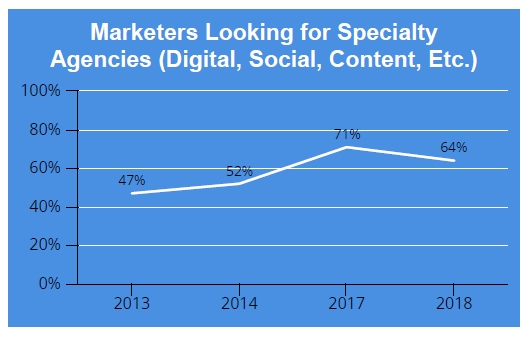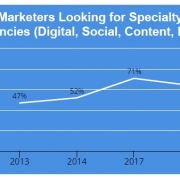Percentage of Marketers Looking For Specialty Agencies Drops For First Time In 5 Years
From our 2019 RSW/US New Year Outlook Survey, an interesting stat: for the first time in five years of our survey, the desire for specialist agencies dropped.
And dropped 7%.
OK, the sky is obviously not falling, 64% of marketers told us they’re looking for a level of specialization from the agencies they work with, but there’s still that dip.
It’s frustrating, to be sure. Agencies are consistently told, you need to find a level of specialization, generalists will find it harder to break through and win the business. (Hey, we’ve said that!) More on that in a moment. First:
Why the decline and what does it mean for your new business program?

It’s tough to pinpoint why this might be. It wasn’t an open-ended question in our survey (next year we should plan on that), so we don’t know precisely why, but a couple of thoughts:
- For small to mid-sized agencies (which are predominantly our client sweet spot) we often see those firms become the client’s marketing department to a great extent. That isn’t always the case of course, but when it is, that client looks to the agency to get it all done, or to partner with other specialized firms to get it done. This feeds into the ongoing agency consolidation we see in this year’s survey as well. So those clients may be seeking out less specialty agencies, and instead looking to their agency to do so.
- From “a senior marketer at a global advertiser who feels no other alternative exists but to take more control from agencies when they can’t be trusted to make the right calls” (Confessions of a marketer: Agencies forced brands to in-house more marketing) comes this quote:
I know people say the agency model is broken and that clients should pay more to fix it, but it’s hard to think that will solve things when you see how petty things can get when working with multiple agencies. Agencies know they need to collaborate — some even want to — but they don’t. And that’s because those businesses all have different agendas which aren’t aligned to mine, so they’re all just focused — understandably — on winning the biggest part of my budget, but in a way that sabotages other agencies on the account or campaign. I think it starts with looking at the business model of those businesses and how they adapt for the future.
This quote does bolster the consolidation trend I mentioned earlier, but I think it also lends itself to the dip in specialization as well. I would argue they’re mutually exclusive in this case, per my first example.
If this is the way marketers perceive multiple agency relationships, fairly or unfairly, then they’re going to stay with fewer agencies who can do the majority of the work, or, again, look to that firm to partner appropriately and let them orchestrate the relationships.
So what does “generalist” actually mean today?
I’ve talked to, and we’ve worked with, agencies who consider themselves generalists. They’ll say, we hear that we should be specialists, but what we’re doing is working, why fix what isn’t broken? Fair enough, and here’s the reason why it’s working-
They still have a focus.
It’s when agencies try to be all things to all people that problems arise. There’s nothing wrong with working multiple verticals, but as we point out in our report, you need to have a defined positioning.
Speaking the prospect’s language
I’ll leave you with this to tie it all together: marketers are still looking for specialists. We see it with our own clients, and as you can see, 64% of marketers in our survey backed that up. However, you can be a generalist, as defined above, and still show your prospects you’re the experts in the services you provide, or over the multiple verticals you service, but one thing to keep in mind.
I’ll illustrate it in a quote from a conversation I had with an agency principal recently:
We can speak the language if we get in the room.
Perfect, and needed, but here’s the question:
Are you speaking their language before you get in the room?
If you aren’t, throughout your prospecting, you’ll never actually get in the room.









